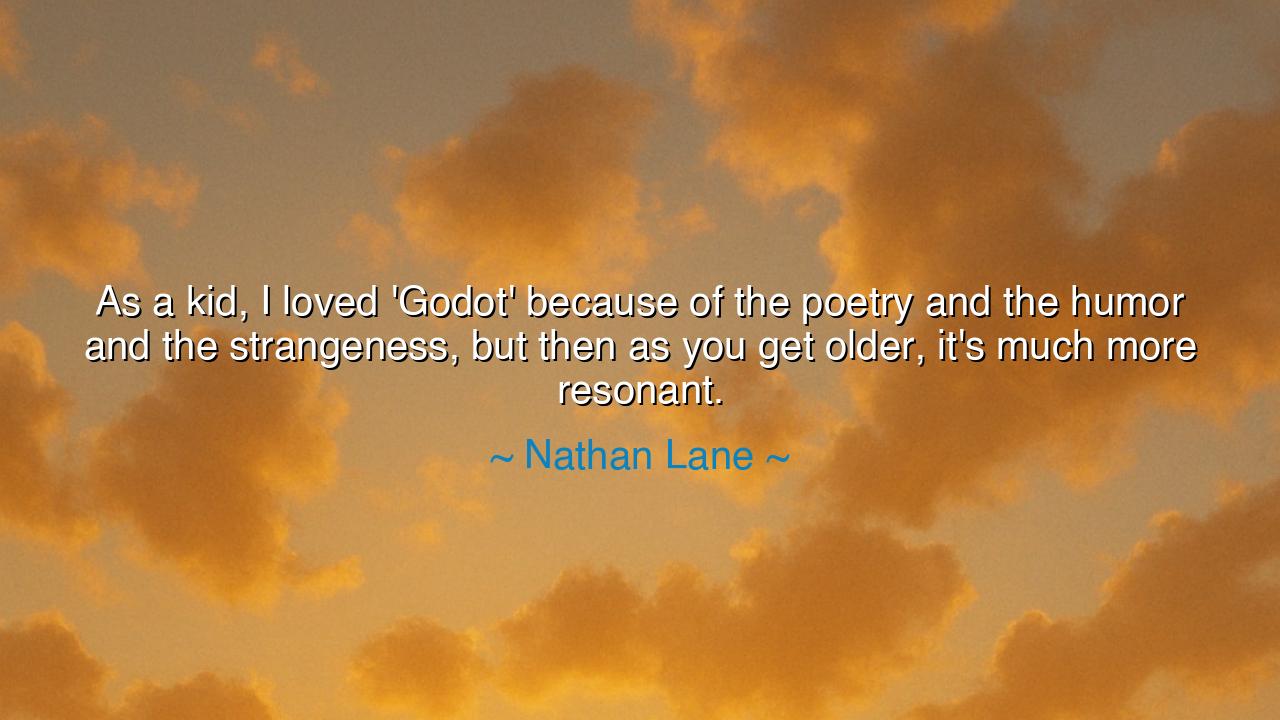
As a kid, I loved 'Godot' because of the poetry and the humor and
As a kid, I loved 'Godot' because of the poetry and the humor and the strangeness, but then as you get older, it's much more resonant.






When Nathan Lane said, “As a kid, I loved Godot because of the poetry and the humor and the strangeness, but then as you get older, it’s much more resonant,” he was speaking not merely of a play, but of the evolution of the soul’s understanding. In his words lies a truth that echoes through every generation: that what delights the child for its beauty or oddness may, in the fullness of years, reveal itself as something sacred and sorrowful. For “Godot”—Samuel Beckett’s Waiting for Godot—is no mere entertainment; it is a mirror of existence itself. Lane’s reflection reminds us that art grows as we grow, and that what once made us laugh later teaches us to see the human condition in all its tenderness and futility.
The origin of this insight lies in Lane’s lifelong relationship with the theatre. As a boy, he was captivated by the magic of words and performance—the rhythm of dialogue, the absurdity of characters, the laughter that sprang from confusion and contradiction. Waiting for Godot, with its wit and mystery, would have seemed to him a delightful riddle, a dance of words that both defied and delighted reason. Yet, as he matured—as he experienced the weight of time, loss, and longing—he came to see in Beckett’s work something deeper: the cry of the human heart waiting for meaning, for redemption, for something—perhaps someone—that never arrives. This is the resonance of which Lane speaks: the moment when the laughter fades, and the silence beneath it begins to sing.
When he recalls loving the play’s poetry, humor, and strangeness, Lane evokes the child’s first encounter with mystery. To the young, strangeness is wonder. The nonsense of the absurd is delightful, because the child still believes that behind chaos there lies hidden order. But with age comes understanding—and with understanding, a gentler kind of sadness. The humor remains, but it changes color. What once made us laugh from surprise now makes us smile from recognition. The strange becomes familiar, and the poetic becomes prophetic. We begin to see ourselves in the tramps, Estragon and Vladimir—waiting, hoping, arguing, laughing—to fill the long pause between birth and eternity.
The ancients knew this truth well. Consider the philosopher Heraclitus, who said, “No man ever steps in the same river twice.” His meaning was that both the river and the man are ever-changing. So it is with art, and so it is with life. The play Lane loved as a boy is not the same play he knows as a man, because he himself is not the same. Experience changes the listener, and thus the song. What once seemed absurd becomes profound; what once seemed empty becomes full of meaning. As wisdom grows, so too does our perception of the world’s mysteries. In this way, Godot—and all great art—serves as a teacher, its lessons unfolding slowly across the years like petals revealing the heart of a flower.
The transformation Lane describes is not confined to the theater—it is the journey of all humanity. When we are young, we laugh easily at life’s absurdities, unaware that one day we shall live them. We laugh at waiting, not realizing how much of life will be spent in that very act—waiting for love, for purpose, for peace, for answers that may never come. As time deepens us, laughter does not vanish—it ripens. It becomes a kind of grace. We come to see that humor and sorrow are twins, born of the same truth: that to live is to hope in the face of uncertainty. In Godot, the men wait endlessly, yet they never stop speaking, never stop finding absurd joy in their predicament. That is humanity’s quiet heroism—to laugh while waiting, to hope while doubting.
History offers us countless examples of this same truth. Consider Nelson Mandela, who endured twenty-seven years of imprisonment and yet emerged with compassion and humor intact. In the long years of waiting, he found not despair, but understanding—the deep resonance of patience, endurance, and the power of forgiveness. Like Beckett’s characters, he lived the lesson that waiting is not mere idleness—it is faith in motion. Through suffering, he learned what youth cannot yet know: that life’s meaning is not always found in arrival, but in persistence, in the refusal to stop hoping even when the world offers no reason to.
Thus, the wisdom of Nathan Lane’s words is this: that maturity brings depth to what youth only glimpses. We must not discard the humor and strangeness that delight us in our early years, for they are the seeds of later understanding. But as we grow, we must also learn to listen beneath laughter—to hear the resonance that speaks of time, loss, and love. Art, like life, is an ever-deepening well. The child drinks from its surface and is refreshed; the elder drinks deeply and is transformed.
And so, my children of art and thought, remember this: do not outgrow wonder—grow into it. What seems simple today will one day speak to you with new power. Laugh freely while you can, and when the laughter grows quieter, let it become wisdom. For the great works of the soul—like Godot, like life itself—are not meant to be understood at once. They are companions for the long road, reflections of our own waiting hearts. And if, as Nathan Lane teaches, we can still find poetry, humor, and strangeness even as life deepens into mystery, then we have learned the highest art of all: to wait with grace, and to live with meaning.






AAdministratorAdministrator
Welcome, honored guests. Please leave a comment, we will respond soon